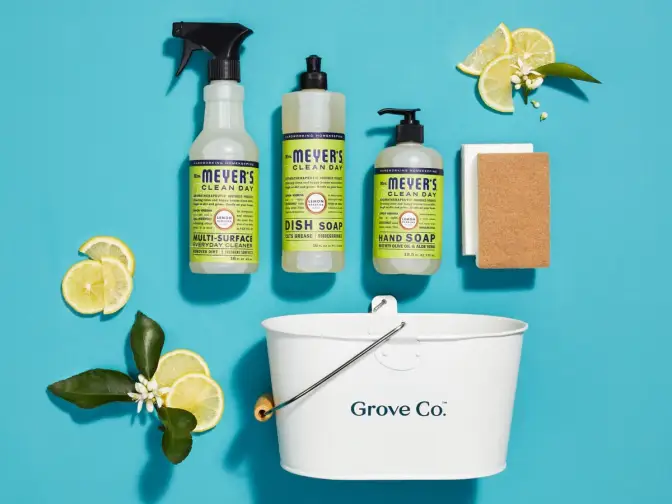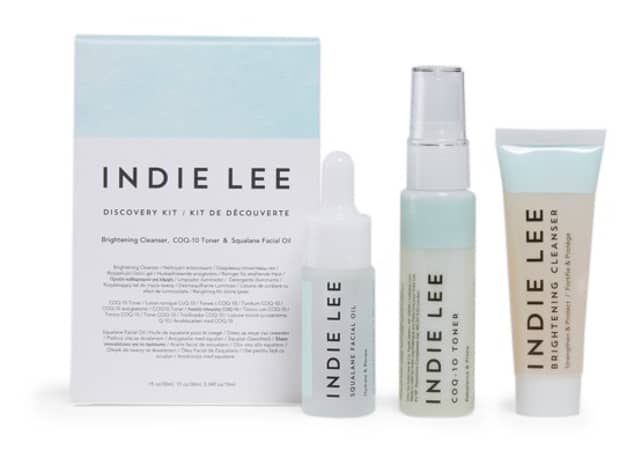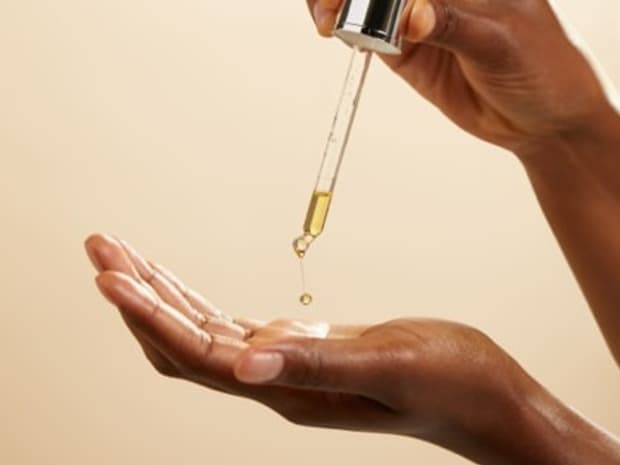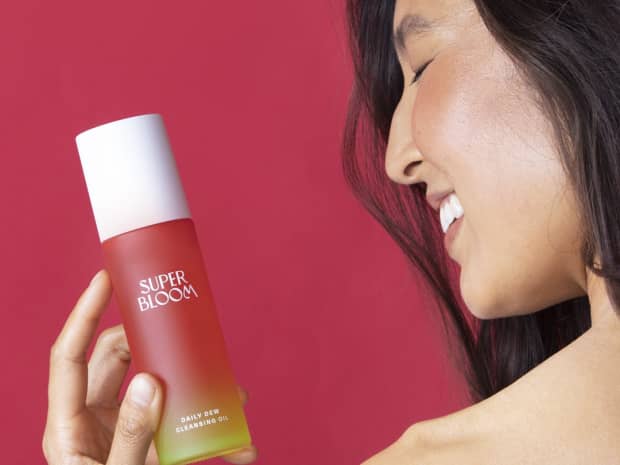
Fights off free radicals
Olive oil is abundant in antioxidants and is fantastic for fighting off free radicals that contribute to premature aging and potentially damage cells.

Last Updated: June 14, 2021
This pantry staple just got a major glow up. Find out about the many amazing benefits of olive oil and how to use this miracle oil in your skincare routine.
We could wax poetic about skincare all day — and we have — but olive oil has definitely earned today’s spotlight. This pantry staple moonlights as a skincare hero and has a ton of benefits that’ll leave your skin happy, hydrated, and glowing.
Amy Hart, Chief Innovation Officer at Elevation Labs, says "Olive oil isn’t just great for your skin as is — we are now working with a variety of functional ingredients that use olive oil as the starting base material, such as emulsifiers and surfactants. Not only is this a sustainable option for plant-based functional ingredients, these types of ingredients work synergistically with other oils to deliver natural, plant-based skin benefits."
If you’ve ever looked at that bottle of olive oil sitting on your kitchen counter and wondered how to incorporate it into your skincare routine, congratulations — you’ve come to the right place.

Wondering who Grove is, what types of products we offer, and how to get a free gift set when you sign up? Learn more about flexible monthly shipments, customizing your shipment, and joining millions of happy households — no monthly fees or commitments required.

Olive oil is derived from the pressing of fresh olives and has uses dating back 6,000 years. A cornerstone of the Mediterranean diet, olive oil has come a long way from its foodie roots and is now found in skincare and beauty products galore.
It’s chock-full of good stuff like fatty acids, antioxidants, and vitamins that create a nutritional cocktail for your skin — and it’s a master moisturizer, to boot.
Olive oil is bursting with skincare benefits and has quickly become a wonder ingredient in many beauty products. From maximum hydration to staving off wrinkles, this light green oil truly does it all.

Olive oil is abundant in antioxidants and is fantastic for fighting off free radicals that contribute to premature aging and potentially damage cells.

Rich in vitamins A and E, olive oil is terrific for staving off the effects of aging. These vitamins promote collagen growth and reduce the appearance of wrinkles.

Olive oil is known for its antibacterial properties, which can help prevent the proliferation of bacteria on your skin to help prevent breakouts and other skin woes.

Because of the omega fatty acids and high vitamin A and E content found in olive oil, it’s great for protecting your skin from dehydration by locking moisture in.
OLIVE OIL FAQ
Cosmetic grade oils might sound like they’re better for your skin, but the truth is that they’re often of lower quality than food grade oils.
For the best results, choose a certified organic, non-gmo, extra virgin olive oil, which is made without heat or chemicals and retains the highest amount of beneficial compounds.
For an all-over body polish, combine 1 cup of white sugar and ½ cup of extra virgin olive oil. If you’re feeling fancy — as you should — go ahead and add five to 10 drops of your favorite essential oil (we really love this one). Use two to three times a week for silky soft skin. This scrub keeps well in the shower for about a month!
An olive oil mask is packed with antioxidant alpha-hydroxy acids to help slough away dead skin. Combine a tablespoon of honey, a tablespoon of EVOO, and two tablespoons of freshly-squeezed lemon juice. Apply an even layer over your face, avoiding your mouth and eyes. Leave on for 20 to 30 minutes, then rinse off.
Get your moisture on with a little EVOO. Apply it as an all-over body oil, or use it solely as a face moisturizer — either way, you can’t go wrong. Olive oil is full of antioxidants and vitamins that’ll leave your skin soft and radiant. Want a brighter glow? Grove writer, Mackenzie Sanford, has hot tips for getting the most out of your moisturizer with jade rolling.
Olive oil provides an optimal environment for scar improvement because it moisturizes the skin and promotes collagen production, leaving scarred skin supple and primed for renewal. Massage the oil into scars or stretch marks twice a day for up to three months for best results.
With its bounty of vitamins and high antioxidant content, olive oil is a prime choice for reducing the appearance of fine lines and wrinkles. Dab a dime-sized amount around your eyes or mouth before bed and let the green stuff work its magic while you catch up on your beauty sleep.
Olive oil works like a charm for breaking down water and oil-based makeup products. Before washing your face, dollop a dime-sized amount into your hands, and gently apply to your eyes, cheeks, mouth — anywhere you’ve got makeup to remove. Gently wipe it all away with a clean cloth — et voila!
Many skin types benefit from olive oil, but it isn’t the best choice for everyone. If you’ve got acne-prone skin or skin that’s naturally oily, take heed before deciding if olive oil is the right addition to your skincare routine. Olive oil can cause redness and irritation, clogged pores, and have an adverse effect on those with eczema.
Olive oil got your skin in a tizzy? No worries! There’s no one-size-fits-all when it comes to skincare oils, and sometimes you have to try a couple before finding the right match for your skin. Here’s some great alternatives to olive oil.

Rosehip oil is currently having a skincare moment, and for good reason. This beloved pressed seed oil brightens and regenerates skin, helps with anti-aging and promotes collagen production. It’s got high levels of omega-3 and omega-6 fatty acids which soften skin and help with acne.

This golden elixir has an abundance of beneficial qualities. It hydrates dry and flakey skin, protects against signs of aging, and is rich in antioxidants like vitamins B, C, and E. Sea buckthorn is one of the only known plants to contain all four omega fatty acids, making it a great choice for skin regeneration and repair.

Squalane oil is another darling of the skincare world. Derived from sugarcane or olives, this clear oil has a ton of moisturizing benefits and is great for aging skin. It protects against sun damage, nourishes with vitamins A, E, and K, and helps retain moisture. Grove writer, Leslie Jeffries, tried squalane oil, and here’s what she thought about it!

Cactus oil, also known as prickly pear oil, is relatively new to the skincare scene, but it’s quickly gaining popularity as a lightweight oil for skincare products. It offers a blast of hydration, soothes inflammation that damages collagen, and it’s great for anti-aging and healing scars. Cactus oil absorbs quickly into the skin, leaving you glowing but never greasy.

Plant-based squalane oil is touted as a highly hydrating, extra-gentle facial oil with anti-aging properties that make it a win for aging skin. Could it really be?

We've pulled the top 15 face oils as determined by Grove members. Select from any on the list and get them delivered to your door!

We've pulled the top 21 serums as determined by Grove members. Select from any on the list and get them delivered to your door!

What happens when you switch from your favorite conventional face wash to a face cleansing oil? We tried it, and we’re here to spill the details on cleansing oils.